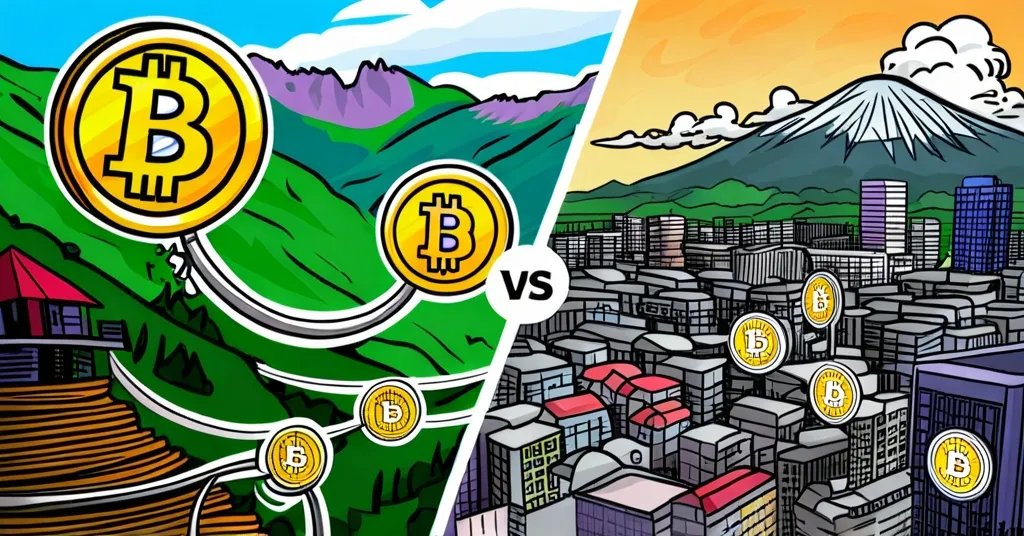Bhutan’s Eco-Friendly Bitcoin Mining: A Sustainable Contrast to El Salvador’s Legal Tender Strategy

Bhutan’s Eco-Friendly Bitcoin Mining Strategy: A Sustainable Approach to Cryptocurrency
Bhutan, the serene Himalayan kingdom known for its unique measure of national well-being, the Gross National Happiness index, has quietly emerged as the fifth-largest sovereign holder of Bitcoin. With 13,029 BTC valued at approximately $780 million, Bhutan leverages its abundant hydropower resources to mine Bitcoin sustainably, marking a significant milestone in its economic strategy since early 2023.
- Bhutan: 13,029 BTC, $780M, eco-friendly mining
- Global rank: 5th in government Bitcoin holdings
- Strategy: Contrasts with El Salvador’s legal tender approach
Bhutan’s approach to Bitcoin stands in stark contrast to that of El Salvador, which has adopted the cryptocurrency as legal tender and a reserve asset. El Salvador holds over 6,000 BTC, valued at around $569 million, and has been navigating a delicate balance since securing a $1.4 billion loan from the International Monetary Fund (IMF), which has required the country to scale back its crypto policies. Both nations, however, are pioneers in the global cryptocurrency landscape, each exploring Bitcoin’s potential in unique ways.
Bhutan’s strategy revolves around its rich hydropower resources, which account for 30% of its GDP. Since 2019, the country has harnessed this clean energy for Bitcoin mining, aligning its crypto endeavors with its commitment to environmental sustainability. Druk Holdings & Investments (DHI), Bhutan’s investment arm, leads these operations, ensuring that the nation’s digital reserves grow without compromising its environmental ethos.
On the other hand, El Salvador’s adoption of Bitcoin as legal tender aims to foster economic inclusion and attract foreign investment. The country launched the Chivo wallet and installed Bitcoin ATMs to facilitate transactions. Yet, despite these efforts, challenges such as technical issues and public skepticism have led to limited adoption. The recent IMF loan agreement has necessitated policy shifts, including making Bitcoin acceptance voluntary and restricting its use for tax payments, highlighting the challenges of this bold move.
Bhutan’s eco-friendly mining approach is a beacon of hope in the broader crypto community’s struggle with sustainability. While Bitcoin’s energy consumption remains a contentious issue globally, Bhutan’s use of hydropower offers a model for responsible mining. This approach not only supports Bhutan’s environmental goals but also positions it as a leader in sustainable cryptocurrency practices.
El Salvador’s journey with Bitcoin, however, underscores the complexities of integrating a volatile digital currency into a national economy. The IMF’s concerns about financial stability and the subsequent policy adjustments highlight the challenges of this bold move. Despite these hurdles, El Salvador’s commitment to its Strategic Reserve continues, albeit with more cautious steps forward.
The contrasting strategies of Bhutan and El Salvador illustrate the diverse roles Bitcoin can play in national economies. Bhutan’s focus on sustainable mining reflects a commitment to balancing economic growth with environmental stewardship, while El Salvador’s integration into everyday financial transactions aims at fostering economic inclusion.
These approaches have broader implications for the global cryptocurrency landscape. They highlight the need for thoughtful and balanced engagement with digital currencies, considering both their potential benefits and the challenges they pose. As more nations explore the possibilities of cryptocurrencies, Bhutan and El Salvador serve as case studies in how different strategies can lead to different outcomes.
The future of Bitcoin and other cryptocurrencies will likely involve a mix of strategies like those seen in Bhutan and El Salvador. As the world grapples with the environmental impact of mining and the volatility of digital currencies, these small nations are at the forefront of finding innovative solutions that could shape the future of global finance.
Key Questions and Takeaways:
- How does Bhutan’s approach to Bitcoin differ from El Salvador’s?
Bhutan mines Bitcoin using eco-friendly hydropower, whereas El Salvador has adopted it as a legal tender and reserve to promote economic inclusion.
- What is the significance of Bhutan ranking fifth in global government Bitcoin holdings?
It showcases Bhutan’s significant involvement in cryptocurrencies and commitment to sustainable practices, positioning it behind major global powers.
- How does the use of hydropower contribute to Bhutan’s Bitcoin strategy?
Hydropower allows Bhutan to mine Bitcoin sustainably, aligning with its development priorities while building digital reserves.
- What impact does the International Monetary Fund’s loan have on El Salvador’s Bitcoin strategy?
The loan required El Salvador to scale back its crypto policies, indicating potential limitations due to international financial pressures.
- What are the broader implications of Bhutan’s and El Salvador’s approaches for the global cryptocurrency landscape?
Both strategies highlight the diverse roles Bitcoin can play, from sustainable mining to economic inclusion, and underscore the need for balanced approaches to cryptocurrency adoption and environmental considerations.



